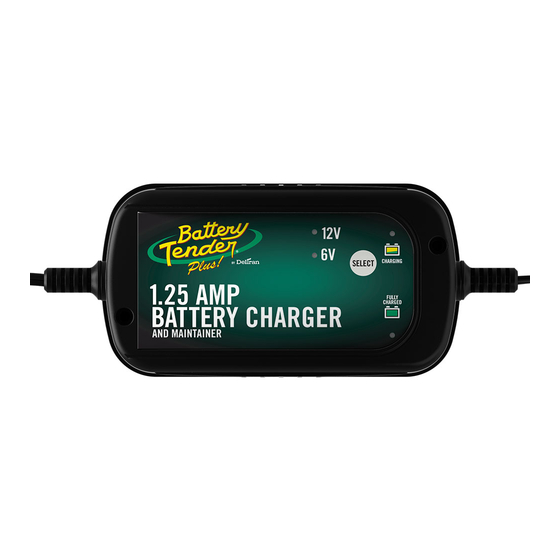Battery Tender Power Tender Plus 24V3A Instructions pour l'utilisateur
Parcourez en ligne ou téléchargez le pdf Instructions pour l'utilisateur pour {nom_de_la_catégorie} Battery Tender Power Tender Plus 24V3A. Battery Tender Power Tender Plus 24V3A 4 pages. Waterproof vibration resistant (vrw) battery chargers

Power Tender Plus
IMPORTANT SAFETY INSTRUCTIONS
SAVE THESE INSTRUCTIONS:
important safety and operating instructions for the DELTRAN
BATTERY TENDER® VRW Power Tender Plus Battery Chargers, both
12V6A
and
24V3A
models.
INSTRUCTIONS BEFORE USING THE BATTERY CHARGER.
WARNING AND CAUTION LABEL DEFINITIONS:
WARNING
WARNING indicates a potentially hazardous situation, which, if not
avoided, could result in serious injury or death.
CAUTION
CAUTION indicates a potentially hazardous situation, which, if not
avoided, may result in minor or moderate injury.
CAUTION
CAUTION used without the safety alert symbol indicates a
potentially hazardous situation that if not avoided, may result in
property damage.
GENERAL PRECAUTIONS
CAUTION
WORKING WITH LEAD ACID BATTERIES AND BATTERY CHARGERS: All
lead acid batteries have the potential to emit gasses that may combine into a
combustible or explosive mixture. In many cases, it is possible that lead acid
batteries will emit these gasses during normal discharge and charging
operations. Because of this potential danger, it is important that you follow the
precautions recommended by both the battery and battery charger
manufacturers before using either one.
USING MANUALS: Study all of the battery manufacturer's precautions and
specific recommendations for safe operation such as not removing cell caps
while charging and the recommended rates of charge (charger output current).
Deltran Battery Tender®
WATERPROOF
VIBRATION RESISTANT (VRW)
Battery Chargers
Models
12V6A & 24V3A
:
This manual contains
CAREFULLY
READ
1
CAUTION
CHARGER LOCATION: LOCATE the charger as far away from the battery as
is allowed by the length of the output cable harness. NEVER set the charger
above the battery. NEVER set the charger on a surface constructed from
combustible material.
CHARGER VOLTAGE COMPATIBILITY: NEVER use a battery charger
unless the battery voltage matches the output voltage rating of the charger.
For example, do not use a 12-volt charger with a 6-volt battery and vice-versa.
EXCESSIVE MOISTURE: The charger body and power cords are fully
waterproof. However, do not expose the AC and DC electrical connections at
the ends of the power cords to rain or snow.
CHARGER ATTACHMENTS:
recommended or sold by Deltran or its affiliates. To do otherwise may result in
the risk of electric shock, fire, or possibly some other unforeseen potential
personal injury situations.
HANDLING POWER CORDS: When handling electric power cords, always
THESE
pull by the plug rather than by the cord. This will reduce the risk of damage to
both the plug and cord, and it will minimize the likelihood of electric shock
resulting from that damage.
LOCATION OF POWER CORDS: Make sure all electric power cords are
located so that they cannot be stepped on, tripped over, or otherwise
subjected to damage or stress.
MONITORING SEALED & NON-SEALED BATTERIES: When leaving a
battery charger connected to either a sealed (AGM or GEL) or non-sealed
(flooded battery) for extended periods of time (weeks, months, etc.),
periodically check the battery to see if it is unusually warm. This is an
indication that the battery may have a weak cell and that it could go into a
thermal runaway condition. If the battery releases an excessive amount of gas
or if the battery gets hotter than 130°F (55°C) during charging, disconnect the
charger and allow the battery to cool. Overheating may result in plate
distortion, internal shorting, drying out or other damage. For flooded batteries,
also check individual cell fluid levels against manufacturer's recommendations
for safe operation.
WARNING
ELECTRIC SPARK & OPEN FLAME: NEVER smoke or allow a source of
electric spark or open flame in the vicinity of the battery or engine. (For
example: Don't charge the battery next to a gas water heater.)
VENTILATION: Do not operate the charger where ventilation is restricted.
The intent here is to allow sufficient airflow to minimize and dissipate the heat
generated by the charger and to diffuse the gasses that may be emitted by the
battery.
CHARGER MAINTENANCE: NEVER disassemble the charger or attempt to
do internal repairs. Take it to a qualified service technician. Assembling the
charger incorrectly may result in the risk of electric shock or create a fire
hazard.
Do not use attachments that are not
2
